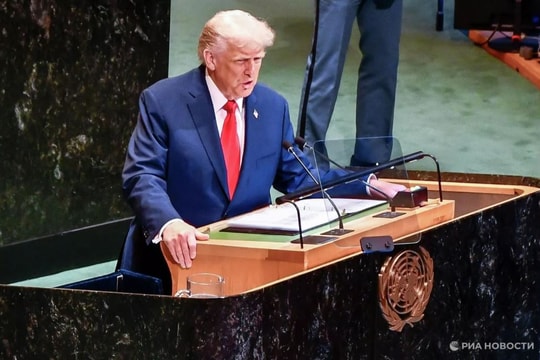American professor wins 2017 Nobel Prize in Economics
Scientist Richard H. Thaler at the University of Chicago has just been announced as the winner of the 2017 Nobel Prize in Economics.
At 4:45 p.m. on October 9 (Hanoi time), the Royal Swedish Academy of Sciences announced that this year's Nobel Prize in Economics went to American scientist Richard H. Thaler. He was born in 1945 and is currently a lecturer in Economics and Behavioral Science at the University of Chicago (USA). His award-winning research deals with behavioral economics.
The Royal Swedish Academy of Sciences noted that Thaler “has introduced practical psychological theories into the study of economic decision-making.” By examining the consequences of limited judgment, social bias, and lack of self-control, he has shown how these human traits systematically influence individual decisions and market impacts.
 |
Richard H. Thaler is currently at the University of Chicago. Photo: Chicago Booth Magazine |
Economics is usually the last prize awarded each year, after the Nobel Prizes in Medicine, Chemistry, Physics, Literature and Peace. The Nobel Prize in Economics was not part of the original prize structure in the will of Swedish scientist Alfred Nobel. This prize was added in 1968, on the occasion of the 300th anniversary of the founding of the Swedish Central Bank - Sveriges Riksbank, which is also the unit that contributes funds for this prize.
However, the nomination, selection and awarding process for the Nobel Prize in Economics remains similar to other fields. The winner of the Nobel Prize in Economics will be awarded 9 million Swedish kronor (about 1.1 million USD).
Last year, the prize was awarded to two scientists, Oliver Hart (USA) and Bengt Holmström (Finland). Their winning research dealt with Contract Theory.
Analysts have previously suggested a few names that could be announced this year. They include Colin Camerer from the California Institute of Technology and George Loewenstein from Carnegie Mellon University, for his work on experimental and behavioral economics.
Another potential candidate is Stanford University economics professor Robert Hall with his analysis of labor productivity, recessions and unemployment. The group of scholars Michael Jensen, Stewart Myers, Raghuram Rajan also stands out with their research on decisions in corporate finance.
List of Nobel Prize winners in Economics 2006 - 2016:
Year | Winner | Project | Nation |
2016 | Oliver Hart and Bengt Holmström | Contract theory | America and Finland |
2015 | Angus Deaton | The relationship between consumption, poverty and welfare. | America |
2014 | Jean Tirole | How to manage large corporations and companies in the market. | France |
2013 | Eugene F. Fama, Lars Peter Hansen, Robert J. Shiller | Asset price analysis | America |
2012 | Alvivin E. Roth and Lloyd S. Shapley | Stable distribution theory and market making practice | America |
2011 | Thomas J. Sargent and Christopher A. Sims | The relationship between macroeconomic policies and their effects on the economy | America |
2010 | Peter A. Diamond, Dale T. Mortensen, and Christopher A. Pissarides | A new formula for interaction in the market, between the party that has goods, services, jobs... and the party that is looking for them. | England and America |
2009 | Elinor Ostrom and Oliver E. Williamson | Methods of economic management | America |
2008 | Paul Krugman | The impact of economies of scale on trade patterns and the location of economic activities | America |
2007 | Leonid Hurwicz, Eric S. Maskin, and Roger B. Myerson | Mechanism Outline Theory | America |
2006 | Edmund S. Phelps | The relationship between inflation and unemployment | America |
According to VNE
| RELATED NEWS |
|---|








